The gig economy needs a creative touch to regulation, not a knee-jerk ban

The gig economy is a central part of what makes London the vibrant, world-class city it is.
From Deliveroo to TaskRabbit to Uber, technological innovation is enabling people to work in ways they never could before and serve the needs of customers.
It should be no surprise that more than one in five of London’s working-age population are employed in this fast-growing sector.
But regulation is lagging behind on how to support a kind of labour model that falls between traditional full-time work and self-employment.
Whether it concerns tax, pensions, paid leave, or other employment rights, politicians need to grasp the nettle and develop regulation that supports and enables the positive benefits that the gig economy can deliver.
Unfortunately, neither Labour not the Conservatives appear up for the task. Labour does not seem to comprehend the benefits of the model and would regulate it out of existence, while the Tories are ignoring the challenges it raises almost entirely.
What we need are imaginative and creative ways of regulating this thriving sector — and the Liberal Democrats have some. Wherever you are in London, you are touched by the gig economy one way or another. Failing to get the regulation of giants like Uber right will seriously hobble London’s prospects. So what can we do about it?
First, we need to modernise employment rights to make them fit for this new way of working. Recognising that gig economy workers like Uber drivers have some of the characteristics of employees and some of being self-employed, what we need is a new “dependent contractor” employment status, that sits in between these two binaries, with entitlements to basic rights such as minimum earnings levels, sick pay, and holiday entitlement.
This should go hand-in-hand with a review of the tax and National Insurance status of employees, dependent contractors, and freelancers, to ensure fair and comparable treatment.
Second, this type of gig economy model isn’t going to work unless we tackle the challenge of zero-hours contracts. The Labour party understands that this is a pressing issue, but its response is to ban zero-hours contracts entirely. This would be a mistake. Yes, they can be exploitative in some instances, but for plenty of people, this flexible model works.
However, in recognition of the insecurity they bring, especially at the poorly paid end of the market, the Liberal Democrats would set a 20 per cent higher minimum wage for people on zero-hour contracts at times of normal demand. This would go some way towards compensating them for the uncertainty of fluctuating hours of work. We would also give workers the right to request a fixed-hours contract after 12 months, not to be unreasonably refused.
There are other things we can do to ensure that gig economy workers don’t lose out, such as reviewing pension rules, protecting portability between roles, and shifting the burden of proof in tribunals regarding employment status from individual to employer.
Once we have a fairer overarching model, we can engage with the specific regulatory challenges facing parts of the sector — such as Uber’s apparent breach of safety regulations, cited as the direct reason why Transport for London refused to renew its licence.
But before we get into the minutiae, what we need is an approach that embraces the changes going on in technology and the nature of employment and adapts our system in response. The Conservatives commissioned a review but have failed to act on many of its findings. The plight of workers in insecure, poorly paid work just doesn’t seem to be a priority for them.
Our approach is pragmatic — not pining for the past like Labour, and not ignoring the issue like the Tories.
The Liberal Democrats are now the natural party of business. We would build a system that is both inclusive and flexible, protecting employees and giving them a voice, while enabling innovative business models to flourish in a modern, dynamic economy.